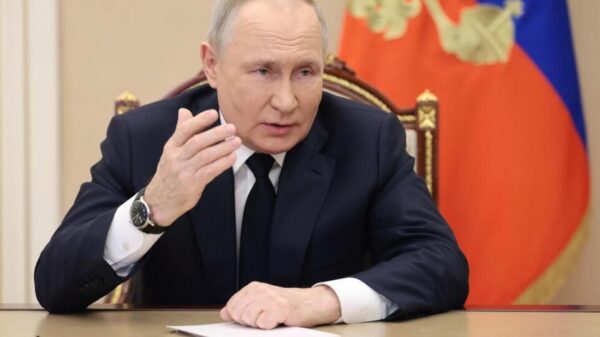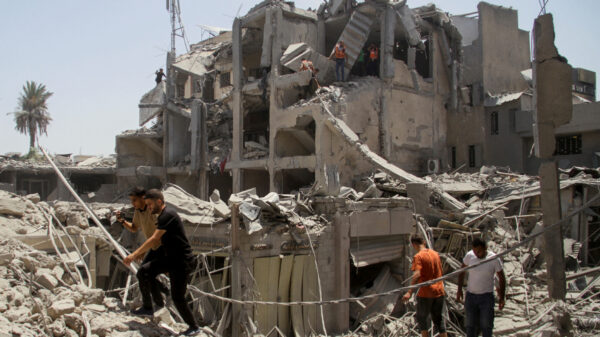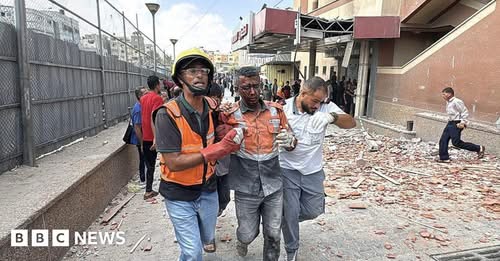21 killed in Ukrainian shelling attacks on Russia’s border city Belgorod: governor
MOSCOW/KIEV, Dec. 31 (Xinhua) — The Ukrainian shelling of the Russian border city of Belgorod has caused 21 deaths, including three children, and damage in 30 apartment buildings, Vyacheslav Gladkov, governor of the Belgorod region, said on Sunday.
“The number of dead has increased to 21 people, of whom three are children. 110 people were injured with varying degrees of severity, including 17 children. To date, various damages have been identified in 30 apartment buildings, 344 apartments, three private households, several businesses and social facilities,” Gladkov wrote on social media. According to a report from the Russian Defense Ministry, Belgorod and the region were shelled by the Armed Forces of Ukraine on Friday and Saturday. The last one was carried out by two rockets with cluster munitions and from a multiple launch rocket system to the city centre.The ministry said that the air defense systems intercepted rockets and most shells on Saturday and destroyed 13 rockets over the territory of the Belgorod region on Friday night.
Meanwhile, citing an unnamed source in Ukraine’s security services, Ukrainian local media reported that the Ukrainian forces struck Russian military facilities in the Belgorod region. The joint activities of Ukraine’s defense forces continue as a “consequence of the Russian missile attacks on Ukrainian cities and the killing of civilians,” the source said. On Friday, Russia launched a massive air attack on Ukraine, killing 30 people and injuring 160 others, according to Ukrainian authorities.
Yearender: Ongoing conflict ravages Sudan’s economy, society in 2023
KHARTOUM, Dec. 31 (Xinhua) — As the Sudanese people expected to see an end to the years-long instability in 2023 to avoid an economic collapse in the country, Sudan slid into a deadly military conflict in April that has been ongoing till now.
HEAVY TOLL ON CIVILIANS
On April 15, residents of the capital Khartoum woke up to the sounds of heavy gunfire and explosions between the Sudanese Armed Forces (SAF) and the paramilitary group Rapid Support Forces (RSF). With the conflict entering its ninth month, all doors seem to be closed to any peaceful endeavor as the two warring parties stick to their divergent positions. The descent into chaos has dashed hopes that Sudan will be able to usher in civilian constitutional rule anytime soon. “The year 2023 is a nightmare for the Sudanese.” Abboud Jabir, a Sudanese politician and former member of the Sudanese Parliament, told Xinhua that “the political division and conflicting positions caused the bloodiest war in our country to break out.”
The consequences have been catastrophic and Sudan is now witnessing the largest wave of internal displacement in the world, according to the UN. More than 7.1 million people have been displaced inside and outside the African country, while about 1.4 million Sudanese are living as refugees in neighboring countries, including Egypt, Chad, Ethiopia, Eritrea and South Sudan, said the UN High Commissioner for Refugees in late December. The civilian death toll from the fighting had surpassed 12,190 with many more injured, according to the latest Armed Conflict Location and Event Data Project.
Meanwhile, nearly 18 million people across Sudan are facing acute hunger, according to the latest report of the World Food Program, while the World Health Organization has warned of increasing rates of outbreaks of epidemic diseases such as cholera, dengue fever and malaria.
DETERIORATING ECONOMY
The conflict has brought Sudan’s stagnant economy to its knees with its public revenue drastically decreasing and the national currency depreciating about 80 percent of its market value. “The fact that over 2.7 million citizens lost their jobs in the private sector and the impact of what we call severe involuntary unemployment has led to a decline in the gross domestic product (GDP) by about 20 percent,” said Abdul-Khaliq Mahjoub, a Sudanese economic analyst. “There was also a decline in the general budget’s tax revenues due to the government’s inability to collect them. This, in turn, led to a large deficit in the national income by about 25 percent,” he said. The collapse of the national currency’s exchange rate was a major reason for the worsening inflation figures, the expert noted, which also limited the purchasing power of citizens and weakened the production capacity of the institutions that are still operating without any government support.
According to a recent report by Sudan’s Central Bureau of Statistics, the inflation rate has exceeded 300 percent, resulting in the soaring prices of basic materials, such as bread, sugar, oil, and flour, as well as the rise in transport and communication costs. The production of gold, the country’s highest non-petroleum export which represents 46.3 percent of total exports in 2022, dropped from 18 tons to only two tons in the period from April to December, according to the Central Bank of Sudan. What’s more, the current winter agricultural season has failed due to the lack of irrigation, absence of fertilizers and pesticides, and inability of banks to provide the required financing, said Mahjoub. The International Monetary Fund estimates that Sudan’s debt is expected to increase from 127 percent of GDP in 2022 to 151 percent by the end of 2023.
UNCERTAIN FUTURE
A meeting scheduled for December 28 between leaders of the SAF and the RSF in Djibouti, which was sponsored by the Intergovernmental Authority on Development (IGAD), an East African bloc, was postponed to January 2024 due to “technical reasons,” said Sudan’s Foreign Ministry.
Abdul-Rahim Al-Sunni, a Sudanese political analyst, said “there are serious concerns that continuation of the conflict and the RSF’s control of most areas of western Sudan will ultimately lead to the division of the country,” expressing his hope that a peace agreement could be reached at an early date, otherwise “the unity of Sudan will be threatened.”
The IGAD is leading intensive efforts to revitalize the faltering talks between the leaders of the warring parties, while Saudi Arabia and the United States are trying to inject new blood into their joint initiative that was launched in May without reaching positive results.
Xinhua’s top 10 world news events in 2023
BEIJING, Dec. 31 (Xinhua) — The following are the top 10 world news events in the year 2023 selected by Xinhua in a chronological order:
1. Generative AI accelerates industrial transformation
The number of monthly active users of ChatGPT, an artificial intelligence (AI) chatbot, reached 100 million in January. Generative AI represented by ChatGPT is developing rapidly, and this revolutionary tool excels in solving tasks such as content creation. Tech giants from multiple countries are competing to pour investment into AI research and development and accelerate the integration of their products with AI applications. As an important driving force for a new round of technological revolution and industrial transformation, AI brings huge opportunities and is expected to accelerate the reshaping of multiple industries. At the same time, it is accompanied by unpredictable risks and challenges. China has put forward the Global AI Governance Initiative to provide Chinese solutions for the global AI governance.
2. Devastating earthquakes in Türkiye and Syria cause heavy casualties
A 7.7-magnitude earthquake on Feb. 6 struck the southern region of Türkiye near the Syrian border, followed by continuous aftershocks. The disaster caused more than 50,000 deaths in Türkiye and more than 1,000 deaths in Syria. Morocco, Afghanistan, Nepal and other countries have also been hit by powerful earthquakes this year, which caused severe losses of life and property damage. China immediately dispatched a rescue team to Türkiye after the earthquake, trying its best to save lives, and provided emergency humanitarian assistance to disaster-stricken countries multiple times, which is a testament to the notion of building a community with a shared future for mankind.
3. Saudi-Iran deal brokered by China spurs reconciliation wave in the Middle East
With China’s mediation, Saudi Arabia and Iran reached a groundbreaking agreement in Beijing on March 10 to resume diplomatic relations that had been severed for seven years. In April, the two countries formally resumed diplomatic ties. The two countries shook hands and made peace, catalysing reconciliation among many countries in the Middle East. In the following months, Syria has rejoined the Arab League, and Egypt and Türkiye have restored ambassador-level diplomatic relations. Additionally, the United Arab Emirates (UAE), Bahrain, and other countries have taken steps towards normalizing their relations with Qatar. The momentum of easing tensions and seeking development and cooperation among regional countries indicates that resolving conflicts and differences through dialogue and consultation aligns with the aspirations of the people, conforms to the trend of the times, and serves the interests of all nations.
4. “De-risking” exacerbates global economic predicament
In March, some Western politicians came up with the concept of “de-risking,” extending the underlying logic of “decoupling” and the “small yard, high fence” doctrine. This goes against economic laws and historical development trends, essentially rejecting opportunities, cooperation, stability and development. Currently, the world economy faces multiple challenges which thwart the recovery process. The Federal Reserve’s continued aggressive interest rate hikes have sharply increased risks in American and European banking sectors, leading to deteriorating global liquidity and rising default risks in emerging economies.
The United States has been persistently advancing protectionist industrial policies such as the Inflation Reduction Act and the CHIPS and Science Act, causing other developed countries to follow suit, destabilizing international production and supply chains. The politicization and weaponization of economic and trade issues by the United States and some other Western countries are disrupting global markets and exacerbating the world’s economic plight.
5. The Global South’s resounding support for multilateralism
On Aug. 24, the BRICS cooperation mechanism witnessed a historic expansion as countries including Saudi Arabia, Egypt, the UAE, Iran and Ethiopia were invited to join the BRICS family. On Sept. 9, the African Union was invited to officially become a member of the G20. Currently, the strength of developing countries is continuously growing, and the collective rise of the Global South has become an irreversible trend. The call and desire for unity, coordination and collaborative development have never been stronger. As the largest developing country, China is a natural member of the Global South, firmly safeguarding the common interests of developing countries and promoting increased representation and voice of emerging market economies and developing countries in global affairs.
6. Japan discharges nuclear-contaminated water amid opposition
On Aug. 24, Japan started discharging contaminated water from the Fukushima nuclear incident, despite widespread international questioning and strong objections from concerned nations. Japan released more than 23,000 tons of nuclear-contaminated water in three rounds of discharge in the year. The entire discharge will take at least 30 years to finish. This unprecedented release of nuclear-contaminated water into the ocean and the potential cumulative marine effects have triggered widespread concern worldwide. The discharge, which is by no means a private matter for Japan, involves the health of all humanity, the global marine environment and global public interests. Japan should seriously address the legitimate concerns both at home and abroad, and handle the Fukushima nuclear wastewater issue responsibly and constructively.
7. Israeli-Palestinian conflict highlights intensifying turbulence globally
On Oct. 7, a new round of conflict erupted between Israel and Palestine.
Over the past two months, the conflict has resulted in the deaths of more than 20,000 Palestinians, leading to a severe humanitarian crisis. More than 1,000 Israelis have also lost their lives. The international call for the protection of civilians and a cessation of hostilities keeps growing. The fundamental solution to the frequent recurrence of the Israeli-Palestinian conflict lies in implementing the two-state solution, restoring the legitimate rights of the Palestinian people, and establishing an independent Palestinian state. Since the beginning of this year, the Ukraine crisis has dragged on, armed conflicts have broken out in Sudan, and coups have taken place in Niger and Gabon. Local conflicts and regional hot spots keep flaring up, and the international situation is becoming more volatile.
8. High-quality Belt and Road cooperation opens new chapter
On Oct. 18, the successful convening of the Third Belt and Road Forum for International Cooperation marked a significant milestone. Chinese President Xi Jinping delivered a keynote speech at the opening ceremony, announcing eight major steps to support high-quality Belt and Road cooperation. This declaration has set a new direction for, opened up a new vision of, and injected new momentum into the Belt and Road cooperation. Over the past decade, more than 150 countries and over 30 international organizations have signed relevant cooperation agreements. Numerous projects have taken root, opening a path toward shared development, cooperation, opportunities and prosperity. The Belt and Road Initiative has become one of the world’s most popular international public goods and the largest-scale platform for international cooperation.
9. Xiplomacy writes new chapter for Chinese diplomacy
On Nov. 15, Chinese President Xi Jinping met with U.S. President Joe Biden in San Francisco, charting the forward-looking San Francisco vision. In this year, Xi paid a state visit to Russia, chaired the first China-Central Asia Summit, attended the BRICS leaders’ meeting in South Africa and paid a state visit to the African country, participated in the APEC Economic Leaders’ Meeting in San Francisco, conducted a state visit to Vietnam, held talks with and sent messages and letters to leaders of various countries and international organizations, and wrote letters and reply letters to youths and friendly people from various countries.
Under the guidance of Xi Jinping Thought on Diplomacy, China’s distinctive major country diplomacy continues to advance on a new journey, having substantially promoted the Global Development Initiative, the Global Security Initiative, and the Global Civilization Initiative. This ongoing effort has injected strong impetus into the building of a community with a shared future for mankind.
10. Climate change intensifies threat to global sustainable development
On Nov. 30, the World Meteorological Organization announced that 2023 is the hottest year on record. Climate change has exacerbated disasters such as flooding in Libya and the deadliest wildfires in Hawaii. Extreme weather events like summer heatwaves have become the new normal, impacting global economic and social development. Almost all sustainable development goals are being compromised. “The era of global warming has ended; the era of global boiling has arrived,” said UN Secretary-General Antonio Guterres.
The UN Climate Change Conference in Dubai reached the UAE Consensus on various issues, including the first global assessment of the Paris Agreement, loss and damage, and just transition, sending a strong signal that all parties should accelerate joint action.
Yearender: U.S. inflation, political dysfunction mark 2023
WASHINGTON, Dec. 31 (Xinhua) — The year 2023 will be remembered in the United States as a year of surging inflation and political dysfunction.
High grocery prices — caused by profligate government spending, as well as disruptions in the global grain and energy supply — have bedeviled Americans all year. Samantha Lehey, 74, a retiree in New Jersey, told Xinhua that she now has to spend 50 percent more on food than she did in 2019. That is difficult for her, as she’s on a fixed income, just like millions of other retirees across the country. It’s also hard for the middle- and lower-income earners nationwide. “Groceries are expensive now,” she said, adding that eggs, ground beef and butter have all gone up in price. It’s highly improbable that the United States will return to 2019 price levels, as a prolonged period of falling prices would need to occur, economists said. And for that to happen, the Russia-Ukraine crisis, which has put a strain on the grain supply, would need to be resolved.
High prices have “hurt consumers and harmed public confidence” in President Joe Biden’s policies, Brookings Institution Senior Fellow Darrell West told Xinhua.
It is evident that the U.S. economy has been surprisingly robust in terms of the labor market, with the unemployment rate in November edging down to 3.7 percent, which is higher than the recent low of 3.4 percent in April, but still close to the lowest on record, according to the country’s Bureau of Labor Statistics. But at the same time, nothing seems affordable anymore. The costs of rent, home prices and food have surged. Still, the inflation that began two years ago has been slowing.
Desmond Lachman, a senior fellow at the American Enterprise Institute and a former official at the International Monetary Fund, told Xinhua that inflation “appears to be on a clear downward path.” The core personal consumption expenditures (PCE) price index, which strips out volatile food and energy prices, rose 3.5 percent in October from a year ago, down from 3.7 percent in September. Twelve-month core PCE inflation peaked at 5.6 percent in February 2022. The downward trend of inflation “has been faster than almost anyone thought possible,” Dean Baker, senior economist at the Center for Economic and Policy Research, told Xinhua.
Since this year, the U.S. Federal Reserve has slowed its pace in tightening monetary policy, as inflation has cooled from its peak in 2022, leaving the interest rates unchanged at a 22-year high of 5.25-5.5 percent.
POLITICAL DYSFUNCTION
The year was also marked by the unprecedented ouster of Kevin McCarthy from the position of House Speaker, just nine months after he struggled to win the gavel in a dramatic 15-round floor fight in January. Amid intensifying intra-party fighting between moderates and conservatives, the Republican Speaker was booted out in a vote led by members of his own party. That occurred after he stirred the ire of some conservative Republicans by cutting a deal with Democrats to avert a partial federal government shutdown. At the heart of the matter is the surging federal budget.
The U.S. federal government recorded a budget deficit of nearly 1.7 trillion U.S. dollars in fiscal year 2023, which ended in September, up 23.2 percent from the previous fiscal year. This adds to the country’s already ballooning federal debt, which exceeded a staggering 33.8 trillion dollars. “The continued political dysfunction in Washington … has put the public finances on an unsustainable path,” Lachman said, noting that there is an 8 percent of gross domestic product (GDP) budget deficit. He added that “public debt … is well on its way to exceed the level recorded during the Second World War.”
The historic ouster of a sitting House speaker, as well as three weeks of failed attempts to elect a new speaker, also underscored the harsh partisanship that has characterized Washington for over a decade. “The ouster of a Republican Speaker shows how contentious American politics has become and the bitter divisions between and within the two major parties,” West said.
Louisiana Republican Rep. Mike Johnson, vice chairman of the U.S. House Republican conference, was elected the new House speaker on Oct. 25, bringing weeks of chaos to a momentary halt. The House had never been speakerless for so long mid-session, The Washington Post said in an analysis, noting that the House was already operating at an unusually unproductive pace. “It will be important to watch how the new speaker negotiates with others and addresses key problems going forward,” West said.
BIDEN SINKS IN POLLS
Meanwhile, the year has seen President Biden’s popularity fall. An NBC poll last month found that Biden’s popularity stands at its lowest in his presidency amid the Israel-Palestine conflict, with most voters viewing him in a “negative” light. A mere quarter of Americans want the embattled president to run again, according to an Economist/YouGov poll last month. Many Americans harbor concerns over the 81-year-old president’s cognitive health. Less than a year ahead of the 2024 presidential election, the U.S. president will be fighting a Republican impeachment bid while his son Hunter Biden, the first child of a sitting president to be criminally indicted, struggles to avoid prison due to tax- and gun-related cases.
As of now, no substantiated evidence has surfaced to show that President Biden, in his current or past official capacities, engaged in the misuse of his position or accepted illicit payments. However, ethical concerns have been raised regarding the international business dealings of the Biden family. “It is the widespread disillusionment that any government operating under the current inept rules will accomplish nothing of use to the average citizen that I find most worrisome,” Greg Cusack, a former member of the Iowa House of Representatives and a longtime Democrat, told Xinhua. “It is this sentiment that I think is behind the reported serious erosion of support for Biden among not only people of color but also among the young,” Cusack said.
On the Republican side, the race has been dominated by former President Donald Trump, despite the four criminal indictments he faces. With Trump taking the lead, former Vice President Mike Pence and Tim Scott, a U.S. senator from South Carolina, among others, recently dropped out of the 2024 Republican presidential race. Cusack believes that Trump could be a “wildcard.” “He had supported the Republicans in moving to shut down the government, and he has been allied with the extremists all year. With him cheering them on, and with his using the multiple courtroom trials he is facing to continue to inflame his ‘loyal’ supporters, who knows what this volatile combination will produce?” said Cusack. A NYT/Siena poll showed Trump winning against Biden in five out of six key swing states. The year 2023, marked by surging inflation and political turmoil, will almost certainly have a major impact on next year’s race for the White House.
UN chief commends peacekeeping mission in Mali as it ends
UNITED NATIONS, Dec. 31 (Xinhua) — UN Secretary-General Antonio Guterres on Saturday expressed his deep appreciation for the UN peacekeeping mission in Mali as it completed its withdrawal from the country.
The UN chief underscored the pivotal role the UN Multidimensional Integrated Stabilization Mission in Mali (MINUSMA) played in bolstering the peace process. The mission was instrumental in ensuring respect for the ceasefire under the 2015 Peace and Reconciliation Agreement, as well as in supporting the transition towards the “restoration of state authority,” Guterres said. The secretary-general expressed his “deepest gratitude” towards the personnel of MINUSMA. The mission’s head El-Ghassim Wane was particularly commended for his “outstanding leadership in a challenging context.”
Regarding the human cost of the mission, the secretary-general paid a poignant tribute to the 311 MINUSMA personnel who lost their lives and the over 700 who were injured. “The entire United Nations family stands in sympathy and solidarity with the loved ones, friends, and colleagues of the fallen staff,” he said, honoring their “selfless devotion to the cause of peace.” With the onset of the liquidation period on Jan. 1, 2024, a smaller team will oversee the transportation of assets and the disposal of United Nations equipment in Mali. Guterres has placed his trust in the “full cooperation of the transitional government” to facilitate the effort. Reaffirming the United Nations’ unwavering support to Mali, the UN chief pledged to continue working with the Malian people towards restoring its constitutional order and promoting peace, security, and sustainable development.
The Security Council on June 30 adopted resolution 2690 to end MINUSMA’s mandate as of June 30. It requested the mission to immediately start on July 1 the cessation of its operations, transfer of its tasks, as well as the orderly and safe withdrawal of its personnel, with the objective of completing this process by Dec. 31, 2023. MINUSMA, established by Security Council resolution 2100 in April, aims to support political processes in Mali by carrying out security-related tasks.
Voter registration for next year’s general elections in Botswana to start Friday
GABORONE, Dec. 31 (Xinhua) — The Independent Electoral Commission (IEC) in Botswana on Saturday announced that voter registration for next year’s general elections will commence on Jan. 5, 2024.
“It is all system going and the registration of voters has been slated for Jan. 5 to Feb. 3, 2024, ahead of the much-anticipated 2024 parliamentary and local government elections,” said IEC Secretary Jeff Siamisang when updating journalists about the IEC’s preparedness in Gaborone, the capital of Botswana, adding that all the materials and human resources needed for the smooth running of the process have been availed. The southern African country’s 1,800 polling stations will open from 8 a.m., local time, to 5 p.m. daily, including weekends. Botswana citizens aged 18 years and above are eligible for registration, said the IEC secretary. This voter registration was postponed twice in November this year after Botswana’s main opposition — the Umbrella for Democratic Change (UDC) — took the IEC to court seeking to be allowed to deploy registration observers across the country.
The registration observers from the UDC were expected to record names, identity card numbers and serial numbers of registration books of voters for the duration of the general voter registration period. The Botswana Court of Appeal, however, ruled against the decision, arguing that the deployment of observers is not provided in the country’s electoral act. Botswana will hold its next general elections in 2024 on the exact month and date yet to be announced.
Death toll rises to 22 in flash floods in South Africa
JOHANNESBURG, Dec. 31 (Xinhua) — The number of people killed in recent flash floods in KwaZulu-Natal Province, South Africa, has risen to 22, with three more still missing, the KwaZulu-Natal Department of Cooperative Governance and Traditional Affairs said on Saturday.
The heavy rains on Dec. 24 resulted in Bellspruit River bursting its banks, causing water to overflow onto the N11 road in Ladysmith Town, KwaZulu-Natal Province. Several vehicles traveling along the N11 and households located nearby were swept away. “KwaZulu-Natal Province premier Nomusa Dube-Ncube has examined the damage caused by flash floods, which have tragically claimed 22 lives as of Saturday, with others still unaccounted for,” the department said in a statement. Communities are urged to report missing persons, especially those who disappeared on Christmas Eve, according to the statement.
The South African Weather Service has warned that sporadic showers and thundershowers are expected in KwaZulu-Natal Province Sunday. The KwaZulu-Natal Department of Cooperative Governance and Traditional Affairs warned residents that there are still likely to be floods since the ground is still saturated due to the past rains.
Botswana, Namibia in joint elephant poaching investigation: official
GABORONE, Dec. 31 (Xinhua) — Botswana and Namibia have embarked on a joint investigation into the increased incidents of elephant poaching in the northern part of Botswana.
“The country (Botswana) experienced a surge in elephant poaching incidents during November and December 2023,” Lesego Kgomanyane, the spokesperson for Botswana’s Ministry of Environment and Tourism, told Xinhua over the telephone, noting that the development has shone the light on the apparent increase in poaching of elephants in northern Botswana. At least four separate incidents involving arrests of poaching groups smuggling elephant tusks were made in Namibia within ten days of mid-November this year, and at least 68 elephant tusks weighing almost a tonne were seized in Namibia’s eastern area of the Zambezi region, which borders Botswana and Zambia, she said. According to Kgomanyane, preliminary investigations into the incidents have established that most of the tusks came from the elephants recently poached in Botswana. Kgomanyane said some of the arrests occurred as a result of a tipoff that Namibia’s Zambezi Region is being used as a transit route to smuggle tusks of poached elephants from Botswana to Zambia.
Major General Goitseone Mothapo of the Botswana Defense Forces (BDF) is leading the anti-poaching brigade from Botswana, who are working closely with their Namibian counterparts. Mothapo told Xinhua that 25 carcasses of recently poached adult bull elephants were identified in Botswana’s Linyanti Game Reserve, north of Botswana, between October and November. The enforcement agencies from both Botswana and Namibia are still verifying the proportion of tusks from poached animals with those that died due to natural causes.
Meanwhile, both the governments of Botswana and Namibia have significantly increased the number of patrol teams in the northern part of Botswana and information sharing between the two neighboring nations.
News Analysis: Türkiye hopes to reap benefits of economic U-turn over 2024
ANKARA, Dec. 31 (Xinhua) — After years of wrestling with soaring inflation and a battered currency, Türkiye hopes the turnaround of the economic policy in 2023 will pave the way for a sustained recovery in 2024. But experts warn the journey will be long and arduous.
The country lurched from ultra-loose monetary policy to fiscal orthodoxy this year, with a new financial team led by Treasury and Finance Minister Mehmet Simsek taking the helm in early summer. Aggressive interest rate hikes since June have sent the policy rate skyrocketing from 8.5 percent to 42.5 percent in just seven months, offering a glimmer of hope for the country to rein in the rampaging inflation. “The tightening we’ve seen since June sets the stage for what’s next,” said Arda Tunca, an independent economist from Istanbul. “We can expect these measures to start impacting inflation in the second half of 2024 finally.” He warned, however, that monetary policy alone won’t suffice, adding that structural reforms are crucial to building resilience against inflationary pressures and addressing Türkiye’s stark income disparities.
Inflation topped 85 percent in October 2022 and remains above 60 percent, inflicting hardship on consumers. However, monthly increases have shrunk from summer highs of around 9 percent to about 3 percent in recent months. The central bank projected annual inflation to peak above 75 percent in May before embarking on a disinflationary path, bringing consumer prices down to 36 percent by December 2024. “Annual inflation is to drop rapidly after June,” Turkish President Recep Tayyip Erdogan told reporters earlier this month, assuring that his country’s economic health is improving.
The Turkish lira, which slumped nearly 30 percent against the dollar in the first half of 2023, continues to depreciate but at a slower pace. This bodes well for inflation, as Türkiye relies heavily on imports. Encouragingly, foreign investors are sending positive signals after the shift to orthodox policymaking, according to Türkiye’s Foreign Economic Relations Board President Nail Olpak. “We receive signals not only from the Middle East but also from Europe and the United States,” Olpak was quoted by Türkiye’s Daily Sabah as saying. The official anticipated stronger foreign interest in Turkish assets after the March 2024 local elections, where Erdogan seeks to regain control of Istanbul and Ankara.
Municipal elections are a hot topic closely followed by economists who fear that the Ankara government could make short-term, voter-pleasing decisions that may derail the current disinflation trajectory. Another concern is that although high interest rates are anticipated to curb disinflation, they will also create significant financial challenges for small and medium-sized businesses, as borrowing costs become notably expensive. “In addition to the economic slowdown, bankruptcies are expected to increase in the real sector next year, especially due to increasing credit costs,” Senol Babuscu, a former senior banker and an Ankara-based scholar, told Xinhua. Babuscu said that this would translate into an increase in non-performing loans for banks.
Despite the challenges, international experts are cautiously optimistic about Türkiye’s potential for recovery. Timothy Ash, a senior strategist at RBC Bluebay Asset Management, sees a positive turn, with 2024 offering “really exciting” prospects. “We’ll see disinflation. We’ll see inflation fall. It will stabilize the lira. And I think that will bring money back to Türkiye,” he told Anadolu Agency in a recent interview.
Palestinians urge speedy prosecution by UN court for South Africa’s case against Israel
RAMALLAH, Dec. 31 (Xinhua) — The Palestinian Foreign Ministry on Saturday urged the International Court of Justice (ICJ) to expedite proceedings on a case filed by South Africa accusing Israel of “genocidal” acts in the Gaza Strip.
The case claims “alleged violations by Israel of its obligations under the Convention on the Prevention and Punishment of the Crime of Genocide (the ‘Genocide Convention’) in relation to Palestinians in the Gaza Strip,” according to an ICJ press release. Noting that South Africa and Palestine are signatories to the United Nations Convention on the Prevention and Punishment of the Crime of Genocide, the Palestinian ministry said “what South Africa presented, relying on Article 9 of the convention, and Israel’s violation of Articles 2 and 3, completely aligns with the duties of nations to prevent the commission of this crime.” The ministry called on the ICJ to swiftly respond to South Africa’s request to prevent the “genocidal” acts by issuing a decision to halt Israeli aggression with a ceasefire in Gaza.
Meanwhile, Hamas called on more countries to submit similar requests to international courts against Israel as it has threatened global peace and security. The ICJ is the principal judicial organ of the United Nations. It was established by the UN Charter in June 1945 and began its activities in April 1946.
Israel launches missile attack near Aleppo int’l airport in N. Syria
DAMASCUS, Dec. 31 (Xinhua) — Israel launched a missile attack near the international airport of Aleppo city in northern Syria on Saturday, the Syrian army said in a statement.
The attack was launched to target military points south of Aleppo, resulting in some material losses, the statement said. The Syrian Observatory for Human Rights said a missile fell in the area of Aleppo International Airport, causing no damage to the airport. The Britain-based war monitor added that there were six loud explosions near the al-Nayrab military airport east of Aleppo. Farms between the villages of Al-Dhahabiya and Al-Sheikh Saeed in the area were targeted, where they are believed to house warehouses and headquarters for Iranian militias, according to the observatory. The attack is the latest in a string of Israeli assaults on Syrian military sites.
Earlier in the day, the observatory said 19 pro-Iran fighters, including four Syrians and six Iraqis, were killed, and at least 18 others were critically injured in a midnight Israeli strike on Syria’s eastern province of Deir al-Zour. It said the attack targeted their positions and a convoy in and on the outskirts of Al-Bukamal city, as well as military headquarters, shipment, and ammunition warehouse near the Syrian-Iraqi border. Israel has recently increased its attacks on Syrian targets in tandem with its military campaign in the Gaza Strip. On Monday evening, an Israeli attack south of the Syrian capital of Damascus killed Seyyed Razi Mousavi, who was one of the longest-serving advisers of Iran’s Islamic Revolutionary Guard Corps (IRGC) in Syria. At midnight on Thursday-Friday, Israel renewed airstrikes on targets in Damascus, resulting in the suspected killing of 11 IRGC members, according to the observatory.
The Syrian Foreign Ministry on Friday condemned the Israeli attacks and urged decisive measures from the United Nations Security Council to put an end to these assaults. Syria has been engulfed in an over 12-year civil war, with the government forces of President Bashar al-Assad, backed by Russia and Iran, fighting against various opposition groups. Israel, on the other hand, has a long-standing policy of preventing Iran from establishing a military presence in Syria by repeatedly conducting airstrikes to destroy alleged Iranian weapons supplies.
UN agency warns of infectious disease spread in Gaza
GAZA, Dec. 31 (Xinhua) — The UN Office for the Coordination of Humanitarian Affairs (OCHA) warned Saturday of the intensification of infectious disease spread in the Gaza Strip, which suffered a lack of humanitarian aid and subsequent disastrous repercussions.
The spread of diseases in Gaza has intensified, especially due to the recent mass displacement throughout southern Gaza and the need for some families to move several times, OCHA said in a statement. The agency added that this situation increases pressure on the already overwhelmed Palestinian health system, which is struggling to meet the enormous needs of the population at a time when the majority of hospitals across the strip are out of service. It explained that nearly 180,000 people suffer from upper respiratory infections, while there are 136,400 cases of diarrhea, with half of them reported among children under the age of five.
Meanwhile, 55,400 people have had scabies, 5,330 have chickenpox, 42,700 suffer from skin rashes, and 126 suffer from meningitis. The statement pointed out that 1.9 million people in Gaza, or approximately 85 percent of the whole population, have become internally displaced, including those who are forced to move frequently to seek refuge. It added that the lack of food and survival items and poor hygiene exacerbate the already difficult living conditions of the displaced and prompt the spread of diseases.
The UN office said that due to the major security incidents that occurred in the vicinity of the Kerem Shalom crossing since it was partially reopened on Dec. 17, humanitarian aid through this crossing between Israel and Gaza was suspended during the past four days. Meanwhile, 81 trucks loaded with food and medicine entered Gaza through the Rafah crossing with Egypt on Friday, the office added. However, the aid convoys could face multiple challenges in their delivery. The UN Relief and Works Agency for Palestine Refugees said the Israeli forces opened fire Friday on an aid convoy that was returning from northern Gaza in a route designated by the Israeli army, leading to damage to one vehicle.
The World Food Program warned a few days ago that the Palestinian enclave is facing the fifth stage of acute food insecurity and that the risk of famine is increasing daily amid intensified conflict and restricted humanitarian access.
Over 100 rescued migrants disembark in Italy
ROME, Dec. 31 (Xinhua) — A migrant rescue ship with 106 people on board disembarked in southern Italy on Saturday, according to local authorities.
The disembarkation took place in the port of Brindisi, and involved 40 minors, some of which unaccompanied, said German NGO Sea-Eye which has carried out the rescue operation. The migrants were found and saved on Tuesday in international waters southwest of the tiny Italian island of Lampedusa, according to the NGO. Official data provided by the Interior Ministry showed Italy registered over 155,700 people irregular arrivals by sea this year up to Dec. 29. The overall figure marked a sharp increase compared to 103,846 people reaching the country by sea during the same period in 2022.
Italy is the main entry gate for migrants and asylum seekers trying to reach Europe for better life conditions and safety through the so-called central Mediterranean Sea corridor. Departing from northern African countries, and especially Libya and Tunisia, migrants and refugees undergo the perilous sea crossing on board of unsafe boats and inflatables. While a minority of them are able to reach Italian shores on their own, others are intercepted and assisted by rescue ships mainly operated by NGOs, Italian authorities, and European Border and Coast Guard Agency Frontex. Many still face tragic shipwrecks before being rescued, due to dangerous waters and poor conditions of their vessels, making the central Mediterranean one of the deadliest routes for migrants headed to Europe.
According to the International Organization for Migration, at least 28,505 people have gone missing in the Mediterranean since 2014, and over 22,500 of them disappeared while crossing the central Mediterranean. Yet, the central route remained “the busiest migratory route in 2023, with more than 152,200 detections reported by national (Italian) authorities in the first 11 months … the highest total on this route for this period since 2016,” Frontex said in November.
U.S. foreign policy depletes wealth of its citizens: American scholar
BEIJING, Dec. 30 (Xinhua) — The foreign policy of the United States is not concerned with the well-being of its citizens and is an immense waste of wealth, an article of the Pearls and Irritations, a journal platform in Australia, has argued.
Noting that U.S. foreign policy has been “hacked by big money,” Jeffrey Sachs, director of the Center for Sustainable Development at Columbia University in the United States, wrote in the article titled “U.S. foreign policy is a scam built on corruption” that “the American people are losing big.” “The failed wars since 2000 have cost them around 5 trillion U.S. dollars in direct outlays, or around 40,000 dollars per household,” Sachs said, adding that the costs continue to mount.
U.S. military-linked outlays in 2024 will come to around 1.5 trillion dollars, or roughly 12,000 dollars per household, if direct Pentagon spending, the budgets of intelligence agencies, the budget of the Veterans Administration, the nuclear weapons program, military-linked “foreign aid” and other security-related budget lines are added, he noted. Americans must overhaul the broken, corrupt and deceitful foreign policy of their government, the U.S. scholar said.















































